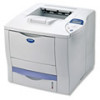Brother International HL-7050N Network Users Manual - English - Page 108
Init/queue/start/on=lta33:/proc=latsym Xj, Lat Network Configuration 9 - 3
 |
UPC - 012502603375
View all Brother International HL-7050N manuals
Add to My Manuals
Save this manual to your list of manuals |
Page 108 highlights
2 Use the VMS editor to create a text file with the necessary configuration commands (alternatively, you may edit the file LAT$SYSTARTUP.COM for VMS 5.5-x and later systems or LTLOAD.COM for earlier VMS systems). For instance, the following sample command file creates a queue named XJ on LAT port 33 for a print server with a default node name of BRN_310107 using the LATSYM processor and the default VMS form: $MCR LATCP CREATE PORT LTA33:/APPLICATION SET PORT LTA33:/NODE=BRN_310107/PORT=P1 SHOW PORT LTA33: EXIT $SET TERM LTA33:/PASTHRU/TAB/NOBROADCAST/PERM $SET DEVICE/SPOOL LTA33: $INIT/QUEUE/START/ON=LTA33:/PROC=LATSYM XJ Substitute your actual node name, port name (P1), LAT port and queue name for the ones in the example. If you are using a service name, specify /SERVICE= servicename instead of /PORT=P1. Use the default names unless you have specifically changed the names. Be sure to specify PROC=LATSYM or the queue will not service requests from multiple host computers. 3 Execute the command file you have just created by typing "@" plus the file name in response to the VMS "$" prompt (for example, @LATSTART.COM). For additional convenience, you may want to include the "@filename" command in your system startup file so that the procedure is executed automatically when the system is booted. 4 Define or modify a form for use with the print server. VMS uses forms to define the page layout. If you are printing graphics or PostScript jobs, you must define your form for NOTRUNCATE and NOWRAP to prevent printer errors. For example, to redefine the VMS default form DEFAULT, you would type the following at the "$" prompt: LAT NETWORK CONFIGURATION 9 - 3















